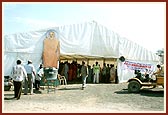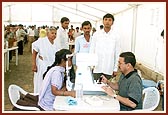|
During
times of natural disasters like earthquakes, floods, cyclones
and droughts, the BAPS rushes help to the victims. Providing immediate
relief, the Sanstha also provides a variety of medical aid.
Floods
of Malda, West Bengal, India, 1995
When the monsoon rains arrived in West Bengal in 1995, they arrived
with a difference. 690 mm of rain fell over the District of Malda,
West Bengal, which resulted in mass flooding. Rs.600 million worth
of crops were destroyed. 54 lives were lost because of the floods
and 47,850 houses were completely washed away or partially damaged.
Disaster relief
is one of the prime activities of the organization. When the floods
hit the District of Malda during the monsoon months of 1995, the
Kolkata center swung into action and started its relief work.
Taking truck loads of clothes, utensils and medicines, BAPS sadhus
and volunteers personally rushed to the worst affected area of
Malda to help. The medicines were given to the medical camps set
up by the government.
Cyclone
of Andhra Pradesh, India, 1996
On 11 November 1996, some 600
kilometers into the Indian Ocean, a cyclone took birth that eventually
bulldozed a 300 kilometer land area at speeds of up to 260 km/h.
East and West Godavari were the worst hit. Damage was estimated
at Rs.20.26 billion. It left 1,000 people dead, 925 missing, and
580,000 homes destroyed.
As well as food
and clothes, the Sanstha also sent a team of qualified doctors
to help the sick and injured. Medicines were also distributed
to medical units working in the area.
Gujarat
Earthquake, Kutch, India, 2001
In the aftermath of the
devastating earthquake that has shocked Gujarat, the Bochasanwasi
Shri Akshar Purushottam Swaminarayan Sanstha (BAPS), through the
inspiration of Pramukh Swami Maharaj, performed a massive relief
operation.
The BAPS had over 100 sadhus and 1000 volunteers helping the victims
in the worst affected areas. The BAPS provided clothing, shelter,
medical aid and had set up kitchens to feed victims and relief
teams.
In addition to the medical camps set up immediately after the
tragedy, BAPS is still continuing with the services of its 2 Mobile
Medical Vans, which have served more than 45,000 patients till
date.
Epidemic,
Surat, Gujarat, India, 1994
From August 26, 1994, outbreaks of bubonic and pneumonic plague
were reported in south-central, south-western, and northern India.
Because most of the reports were unconfirmed, the extent of the
outbreaks was unclear. However, a total of 693 suspected bubonic
or pneumonic plague cases with positive test results for antibodies
to Yersinia pestis were reported by India to the World Health
Organization (WHO). Cases were reported from five states, Maharashtra
(488 cases), Gujarat (77 cases), Karnataka (46 cases), Uttar Pradesh
(10 cases), and Madhya Pradesh (4 cases) and from the federal
district of New Delhi (68 cases). Some 156 fatal plague cases
were reported nationwide.
On 22 September 1994,
cases of pneumonic plague were found in the city of Surat, Gujarat.
By September 26, several hundred pneumonic plague cases and numerous
deaths were noted.
The Sanstha has an
active center in Surat. As soon as the outbreak of the plague
was reported, Pujya Pramukh Swami Maharaj ordered medicines to
be sent immediately to the city.
- More than 100,000 Tetracycline
tablets and mouth-guides were distributed free.
- Moreover, the volunteers of
the Sanstha served food and tea to more than 3,000 pneumonic
plague patients in the Civil Hospital of Surat for more than
a month on request of the Collector of Surat.
Maharashtra Earthquake Disaster, India, 1993
It took only a few seconds for the world of many Indians to come
crumbling down. The earthquake that struck Latur and Osmanabad
in the State of Maharashtra on 30 September 1993 had a terrifying
force of 6.4 on the Richter scale – powerful enough to put more
than 30,000 people to sleep forever. It was India’s worst earthquake
since independence in 1947.
Official statistics
show that about 86 villages of the two districts – Latur and Osmanabad,
were hardest hit by the earthquake.
In 24 hours, a team
of 25 sadhus, doctors and volunteers of the organization reached
the village of Samudraal with 2,000 Kg. of food and medicine.
The volunteer force peaked to more than 250 during the relief
work. About 160,000 Kg. of food, clothes along with medical aid
was distributed in 15 villages. The injured and sick were looked
after by the devoted doctors of the organization. Another team
of volunteer doctors of the Sanstha traveled from village to village
helping the injured and moving the seriously injured to makeshift
hospitals set up by the government. A ‘Pitru-tarpan’ ceremony,
where ablutions to souls of the deceased, was also held.
The Sanstha provided
medical relief to 15 villages in the disaster area, namely:
1. Samudraal
2. Kondjigadh
3. Kaddora
4. Kaddeo Nimbal
5. Kal Nimbala
6. Udatpur
7. Murshidpur
8. Balsur
9. Vilaspur (Pandhari)
10. Vadi
11. Mulgaon
12. Holi
13. Peth Sangali
14. Rajegao
15. Rajegaon Sinhcoli
Morbi
Flood Disaster, Gujarat, India, 1979
It has been written down in history as ‘the worst flood disaster
of the century in India.’ The floods that hit Gujarat in August
1979 left thousands of people and cattle dead. Thousands more
were made homeless. Crops were destroyed and washed away.
Volunteer doctors
of the Sanstha were rushed to help the injured and sick. In total
1,650 people benefited from the medical help. Thousands more were
given prevention vaccines against Cholera and Tetanus by our doctors.
- After the cyclone at Kandala
in 2000 our team of 50 doctors served at Pramukh Swami Hospital
at Gandhidham and medicines worth Rs. 500,000 was donated to
Govt. of Gujarat by BAPS.
- During post earthquake at Kachchh,
Bhuj, Pramukh Swami Hospital, Bhuj has treated 40,154 patients
and the two mobile dispensaries have treated 27,394 patients
in 48 villages. This work is still continuing with dedication.
|






